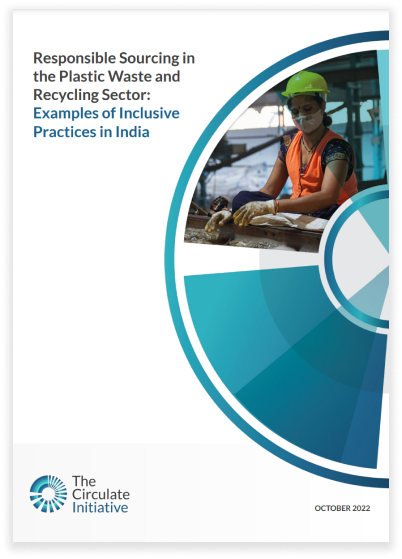

Responsible Sourcing in the Plastic Waste and Recycling Sector: Examples of Inclusive Practices in India
The waste management and recycling industry in South and Southeast Asia is dominated by the presence of informal waste workers. As global brands set targets to increase recycled plastic content in their packaging and investment is funneled into the sector, there is an opportunity to improve existing value chains and advance equitable livelihoods for informal waste workers.
To support strategy and policy-making, The Circulate Initiative conducted a series of interviews with India-based portfolio companies of our mission-aligned investment partner, Circulate Capital, which has initiatives in place to benefit informal waste workers. This report provides an overview of the social and human elements linked to recycled plastics procurement to better understand the risks associated with existing practices, as well as where opportunities for change lie.
Key responsible sourcing practices that emerged include:
- Social and Financial Support: This includes providing equipment to ensure the health and safety of workers as they go about their waste-picking activities, or engaging these workers as formal employees, thereby enabling greater financial security. These initiatives serve to advance workers’ welfare and their livelihoods.
- Access to Government Services: In India, the government has several beneficiary schemes in place for its citizens. However, many informal waste workers are not registered under these schemes, due to a lack of the necessary documents for the application process and/or a lack of awareness of the benefits available to them. Access to these services could go a long way in improving the lives of informal waste workers.
- Digitization, Traceability, and Transparency: Digitization in waste management is becoming increasingly widespread, enabled by the rapid advancement of technologies and the transformation of India into a digital economy, as well as recent Extended Producer Responsibility (EPR) regulations. Digitization can enhance traceability and improve the efficiency of operations, and promotes transparent practices across the supply chain.
- Compliance Needs: Legal requirements present a fundamental need for businesses to conduct their operations according to a set of established standards. While abiding by these regulations is not necessarily a responsible sourcing initiative driven by companies, many global procurement standards and responsible investment principles require compliance within their supply chains. These are crucial when local regulations may not be sufficiently enforced.

Read Report
*By clicking the "Download" button, you are agreeing to The Circulate Initiative’s Terms of Use and Privacy Policy.